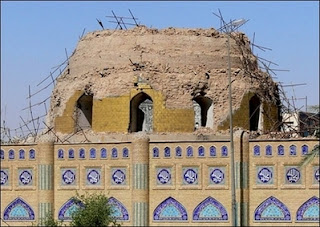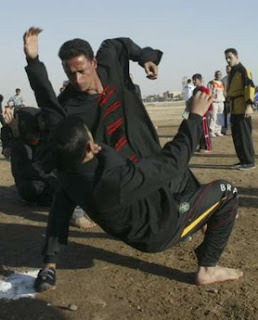Sunnis will provide security for the rebuilding of the Shiite Shrine in Samarra.
The Al-Askari shrine in Samarra, Iraq. Iraq’s premier has formed a council of Sunni tribesmen from the town of Samarra to provide security so that the damaged Shiite shrine there can be rebuilt. (AFP/Dia Hamid)
The following is a translation by Iraqi-American Haider Ajina of an article in Iraq’s Buratha News on December 12, 2007:
Iraqi Finance minister refers to positive indicators in the Iraqi economy
In a joint press conference held by Iraq’s planning and finance ministers, Iraqi Finance minister Bayan Jeber Alzubaidi announced, “The government has decided to exempt from income tax all Government employees who earn a monthly salary of 700 thousand Dinnars or less. Income tax is currently 10%. This should help government employees.” He added, “There are positive indicators for the Iraqi economy.” He criticized the ‘Dollaring’ of the markets. Many businesses seem to deal in US Dollars or Euros, instead of the Iraqi Dinnars. ‘This is a painful and harmful illness to the Iraqi economy’. Alzubaidi said. My ministry has been fighting this with new economic policies. We have raised saving accounts interest rates which increased deposits in Banks. Alarfidain Bank which was paying 4% in 2006 is now paying 12%-14%. This encouraged citizens to deposit their funds in Iraqi banks, instead of keeping the money in their homes. This is a positive indicator.
There are over 25 types of Small Business and individual Business loans given by the government. This has helped in bringing unemployment down from 70% to 20% and inflation down from 66% to 20%. The government is encouraging the private sector and combating unemployment. We have a program that allows any government employee to receive 50% of their pay for two years if they move to the private sector.
The planning minister Ali Baban said that the 2008 budget is one the third world’s most citizen supportive budgets. The budget for 2008 has over 10 billion dollars to augment food stamps, and government employees their pensions and social security. He addressed the shortage of housing by saying that the ministry hat put together a number of plans and submitted them to the executive office for implementation. The planning ministry will implement clearer and more transparent policies in funding Iraq’s different regions from privatization programs. Future plans are aimed at combating unemployment and support specific segments in need of support instead of broad unfocused support.

Contestants from a local taekwando team demonstrate their skills during the opening ceremony of a local sport championship in Falluja, 50 km (30 miles) west of Baghdad December 13, 2007. (REUTERS/Mohanned Faisal)
The following is an article from Voices of Iraq 12/12/07
Safe Falluja…sounds of reconstruction instead of bullets whizzing
Falluja, Dec 12, (VOI) – The city of Falluja, which for a long time remained a stronghold of gunmen, lives these days within different circumstances as construction and building movements began replacing shooting and bullets whizzing by, coinciding with the spread of calmness and stability.
Most of the main streets in Falluja have been lightened with lasers, construction on the Falluja modern hospital are coming to an end, and there are scores of health centers and schools that have been established in a very modern style.
Local residents in Falluja can optimistically start work optimistically with the new conditions of daily life and reconstruction projects that have contributed to putting smiles on the faces of residents in Falluja, who once lived in fear because of battles, assassinations, and random killings.
Saad Hatem, 35, a citizen who works for al-Aani construction company contracted to build al-Hadra bridge in central Falluja in Anbar told the independent news agency Voices of Iraq (VOI) “I started my work safe and not threatened by armed groups which controlled the city, not to mention the difficulty in finding a job, but now and because of the big reconstruction projects in Falluja, there are many job opportunities.
You can see dozens of Iraqi police forces who are patrolling the city instead of gunmen spread over the city, and with the beginning of each day people rush to work, while police try to organize the traffic.”
Ahmed al-Hetawi, 29, a police lieutenant in the Falluja police said “I have been standing in the street since early morning and organizing traffic. People are no longer scared and they tell us how comfortable they feel because of our presence. Police forces now protect mosques, reconstruction projects, and residential areas.”
“I could not ride any police vehicle without hiding my face, for fear of getting killed, but life is different now and I am standing in central Falluja with my face unveiled to everyone,” he added.
Life also returned to cafes. The number of cafes increased from only two to more than 10 cafes throughout the city.
Khalaf al-Ulwani cafe, one of the oldest cafes in the city of Falluja in al-Resafi neighborhood in the western side of the city, witnesses scores of visitors every day.
Abdul Mahdi al-Muhamadi, a retired school teacher, said that “life became safer in Falluja and I’m glad to be able to sit in a cafe once again. I feel so comfortable with the presence of police forces and I wish that the checkpoints at the city’s outlets would be removed.”
…Garbage areas turned into gardens and football courts where scores of young men play, and between residential areas separated by concrete blocks you can see old men sitting in front of their homes drinking tea and engaging in conversations.
Falluja, one of Sunni Anbar’s main cities, lies 45 km west of the Iraqi capital Baghdad.
The following is a translation by Haider Ajina of an article in Iraq’s Al-sabah of Dec 12 2007
Iraqi to receive full national security responsibility by Mid 2008
Iraqi PM Noori Al-maliki wrote a letter to the Iraqi National Security Council. In his letter he addressed the four fundamental points to request final one year extension of the deployment of MNF in Iraq. This letter also refers to the goal of transferring security responsibility of all Iraqi provinces by mid 2008. A hand over celebration for Basra province is scheduled for Sunday December 16th. Analysts following this process, pointed out that Almaliki wishes all security to be transferred to Iraqi security as soon as possible, especially after the recent success of the Iraqi forces.
Almaliki also put forward plans fro revitalizing the economy and improve public services; over 19 billion dollars have been budgeted for this in the 2008 budget. In his
letter to the INCS the PM wrote, “Our armed forces (IF) achieved advances in their mission to implement security, in just 4.5 years. Thus we need a final one year extension for the MNF, to provide the balance between back up and support for IF and advances in security achieved in Iraq. The Iraqi government is responsible for recruiting, supplying, arming and training IF. The PM adds in his letter that as Iraqi security forces take charge of all Iraqi armed forces in Iraq as well as take responsibility for all arrests, filling of charges, we are asking for the contingency to shorten the extension if requested by the government.Iraqi Member of Parliament MP Hassan Alsanied said that the government has a goal of receiving security responsibility for all the provinces in Iraq by mid 2008. He added the government has recently achieved many security successes and, security for Basra will be handed over in a ceremony on Sunday. Yesterday the Prime Minister announced the willingness and ability of the Iraqi forces to take over security responsibility for Basra. Iraq has shown signs of final victory over Alqaida (in Iraq) and the outlawed armed groups. We are ready for the hand over of security in Basra because of strong collaboration between the Ministries of Interior and Defense security forces.
Haider Ajina comments:
Economic and reconstruction progress is moving at a quicker pace. The improved security, thanks to the surge, is allowing infrastructure improvement (from increased oil revenue) and an improved economy, accelerate progress in Iraq. This in turn improves security which in then allows for improves infra structure and the economy. This cycle tends to speed up rapidly. Much construction in Felujah in the article above is a good example of this. The improved economy in the above article collaborates this also.
Basra is one of Iraq’s southern provinces and second most populated. It has an area of 7,363 sq mi and an estimated population of about 2,600,000. Basra is soon to be handed over to the Iraqis. Then nine out of eighteen Iraqi provinces will be under provincial control. The provinces under full Iraqi control will be a total of 41% of Iraq’s territory and 41% of the population.
All this has been achieved, (thanks to our men and women serving in Iraq and the Iraqis grasping this opportunity) in a country with little experience in democracy and the rule of law in its recent history and after 30 years of tyrannical rule, and only 4.5 short years since the liberation, and combating terrorist trying to destabilize an elected government.
Regards,
Haider Ajina
